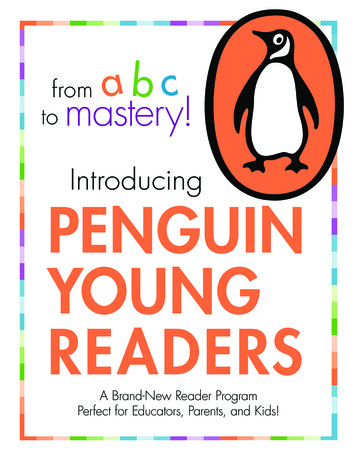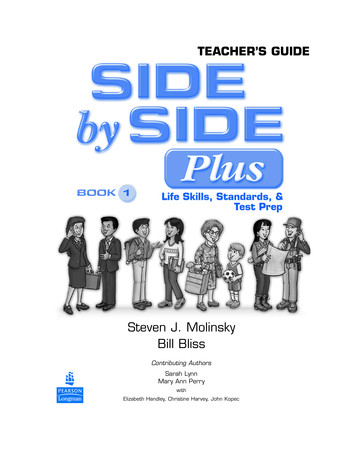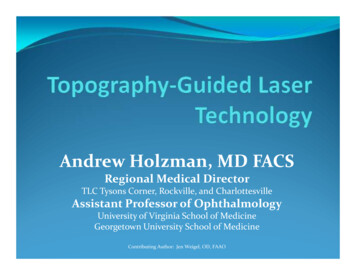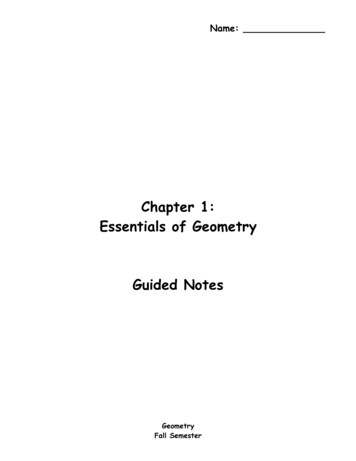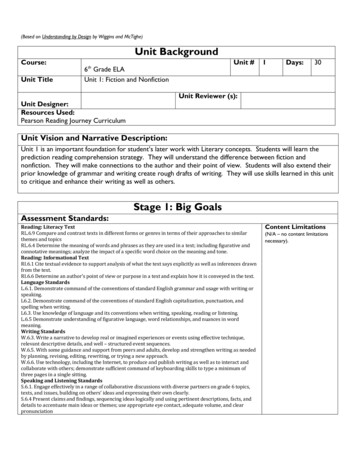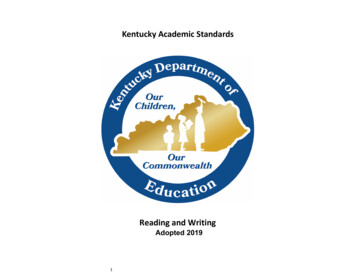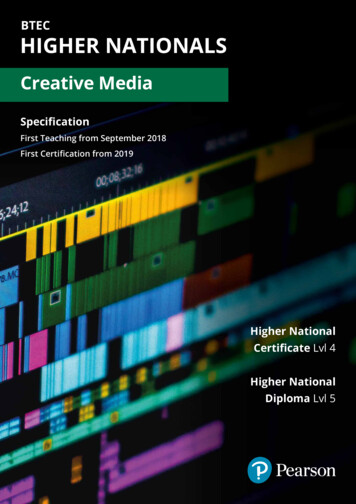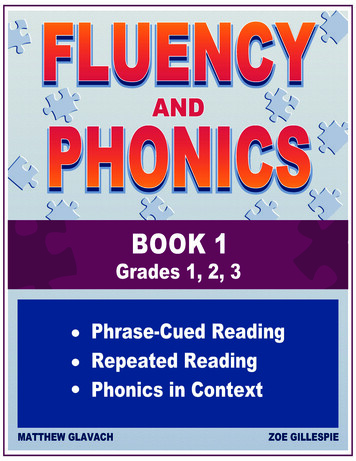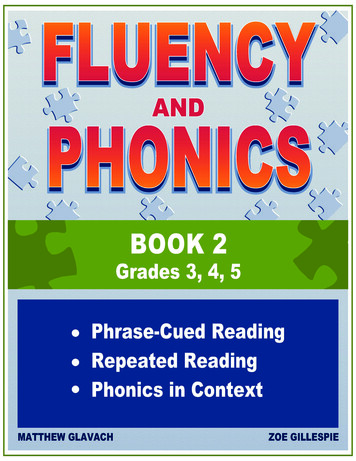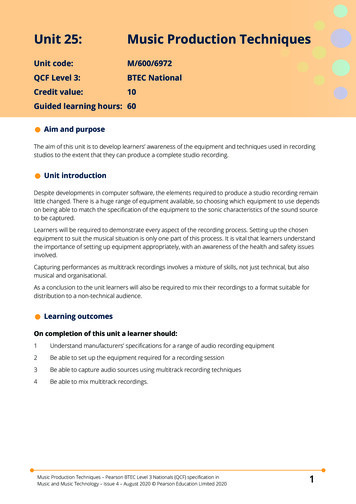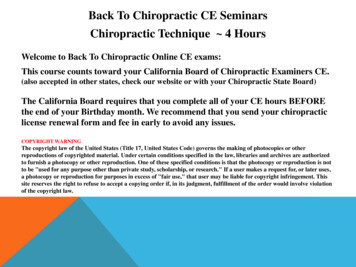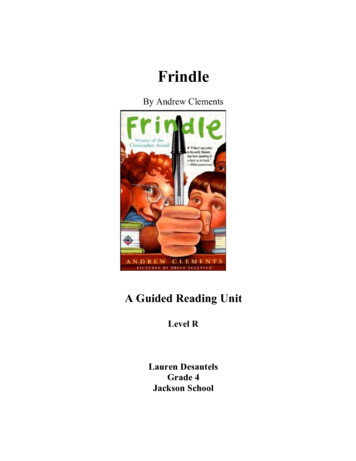
Transcription
FrindleBy Andrew ClementsA Guided Reading UnitLevel RLauren DesautelsGrade 4Jackson School
Session One(30 minutes)1. Pre-test2. How Guided Reading Will Work3. Expectations for You4. Teacher’s Introduction to Frindle5. First Focus Sheet and mini-lesson
Name:I would like to get to know you better as areader. I am wondering what you do whenyou read a fiction story about kids like you.What is the easiest part of reading?What is the hardest part of reading?What are some things good readers do before reading?What are some things good readers do during reading?What are some things good readers do after reading?
How Guided Reading Will Work1.Your group will meet according to aschedule. Each meeting will last 20-30 minutes.2. You will have a chance to finish yourreading assignment before we meet each timeto talk about it.3. At group meetings you will discuss the storyand everyone will have a chance to share whatthey think.4. When you tell about something specific inthe story, help the rest of us locate the place.Name the page, and tell us where to look onthat page.Example: page 12, middle, starting with the word,“Then”5. When you share your thinking, you tell yourideas and give evidence from the text toexplain why you are thinking that way.Example: I think that Lupe Medrano is competitive,because on page 4 is says that she “was theschool’s spelling bee champion, winner of the readingcontest at the public library three summers in a row,blue ribbon awardee in the science fair, the topstudent at her piano recital, and the playgroundgrand champion in chess”. That tells me that Lupelikes to win, because she has awards fromcompetitions in lots of events.6. Sometimes you will have the chance toshare your evidence by reading a part of thestory out loud.
EXPECTATIONS FOR YOUWhat is my job during guided reading?Read the pages in your book.Think about the story.Write down your ideas.Bring your guided reading folder.Listen to others when they arespeaking.Share your ideas.
Frindleby Andrew ClementsTeacher’s Introdu ctionFrindle is a book in the realistic fiction genre. It is a bookabout kids just like you, and has familiar settings like home andschool. Andrew Clements often writes books about the lives ofordinary kids. Even though the events in this books did not happen,they COULD happen!Have you ever thought about where words come from? Whatwould happen if everyone started calling an ordinary object by adifferent name? That’s what happens to a boy named Nick Allen whodecided to call a pen a frindle. At first, just a few of his friends usethe word because they think it’s funny, but soon the whole town is inan uproar!While you are reading I want you to pay attention to the differentpoints of view of the characters, so we can find out why they thinkthe way they do.First Focus (Discuss sheet 1 and distribute books)Clarify with a mini-lesson: T models “noticing” details of a character byreading.If a character jumps off a high cliff to a pool 200 feet below, that is “showing “ yousomething about the character. Maybe he is daring and brave, or maybe he is wildand a little bit crazy. Showing is more powerful then telling but it leaves it up to you,the reader, to draw a conclusion about the character based on what you wereshown. If the narrator simply says, “Tom liked to take risks,” that is telling; it is notas powerful as showing.
NameDiscussion # 1Chapters 1 an d 2Strategy: Expert Readers know and recognize when an author shows instead of just tells.He might show you an example of something a character does, which will helpyou to get to know that character better.Focus Work Your job is to look for evidence that the author has shown you somethingabout a character instead of just telling you. You will notice details aboutNick in Chapter 1 and details about Mrs. Granger in Chapter 2CharacterNickMrs. GrangerEvidence from Text This Shows
Summary of pages 1-12P1 Is Nick a trouble maker? Turns 3rd grade classroom into a tropical islandP2 Nick turns up thermostat, and tracks in sand, kids wear shorts and play volleyball, Mrs.Danvers love it. Principal walks in, party stopsP3 Nick hears about blackbird chirps on discovery channel, he chirps in silent reading, Mrs. Averydoesn’t know who did it, “shhhhs” the classP4 Mrs. Avery thought Janet peeped, gets her in trouble. Nick apologizes later b/c they’re friendsP5 Tells Janet it was him, she starts peeping (high pitched) for the rest of the yearP6 5th grade real grades, no morning recess, Mrs. Granger is only LA teacher, has perfectattendenceP7 MG does not wear pants, only wears grey or blue skirt-and-jacket uniform w/cameo pin. Small,eyes that make you feel like a speck of dust or twinkle and laugh. Has x-ray vision, makes you putgum on an index cardP8 Makes you wear the card and get it signed by parents, Worships the dictionary, long vocabtests, word of the day,P10 Has a large dictionary on a table in front of the room, “Look it up!” battle cry, sends homeletter to parentsP11 Every students needs to get a dictionary, N thinks he can get meanings of words by reading orasking dad/brotherP12 5th grade is going to be a long yearClarify with a mini-lesson: T models “making predictions” while reading.Expert readers use knowledge of human behavior to anticipate what might happen ina text. Predicting helps us think about what might happen next. In order to be activereader, I always need to make sure to check or change my predictions. When I wasreading, I predicted that Nick and Mrs. Granger won’t get along. This is becauseNick and Mrs. Granger are very different. Nick likes to have fun and joke around,like when he “peeps” during quiet reading, p 4. Mrs. Granger is no-nonsense, andsent home a letter about spelling and grammar homework during the summer, p 11.It turns out I was correct, because Nick groaned, p 11, and thinks 5th grade will be along year p 12.
NameDiscussion # 2Chapters 3 an d 4Strategy: Expert readers use knowledge of human behavior to anticipate what mighthappen in a text.Focus Work Use what you know about how kids behave (including yourself) to predict what might happen in some of the events in Chapter 2 and 3.Nick asks a question right before the bell rings. Can you predict Mrs.Granger’s reaction?Come to group prepared to share how you used your background knowledgeto come up with predictions and how you were able to check your predictionsagainst what the author decided to have his characters do. We will recordyour predictions on a chart, and revisit them later in the book.1.2.3.
Summary of pages 13-21P13 1st day goes smoothly until MG class, vocab pretest, cursive handwriting, heading sheetP14 N expert at asking ? to delay hw, timing and the right ? is important, N has been successful,MG pauses, N raises handP15 “Where do all the words in the dictionary come from?” MG knows, smiles too sweetly, doresearch and give an oral report tomorrowP16 N feels small, shut down, don’t mess with Lone GrangerP17 Rule is Homework First, older brother complained about it until he got to collegeP19 N never had hw until MG, hw takes almost an hour, still needs report, finds intro in dic w/ histopicP20 (confusing dic excerpt) it’s like reading ingredients on shampoo bottleP21 Finds kids encyclopedia, reads about dictionaries, doesn’t understand it either, gets an idea tomake the oral report special for MGClarify with a mini-lesson: T models critiquing the actions of a character.Expert readers make judgments about the actions of a character based on what theypersonally believe is right or wrong. They present facts and evidence from the storyto support their beliefs. For example, on p15, Nick tries to stop getting homeworkby asking a perfectly-timed question. I think that this is a bad idea! Even if hisfriends think he’s funny, he might get in a lot of trouble with Mrs. Granger. I wouldbe too scared of a strict teacher like Mrs. Granger, so I think that trying to get out ofhomework would be too risky.
NameDiscussion # 3Chapters 5 an d 6Strategy: Expert readers make judgments about the actions of a character based onwhat they personally believe is right or wrong. They present facts and evidencefrom the story to support their beliefs.Focus Work In Chapters 5 and 6, Nick has TWO “big ideas”. Do you think he was rightor wrong to act out his plan? Use your personal beliefs to help youmake your own judgment about Nick’s actions. Jot down events fromthe story that support your point of view.1)2)
Summary of pages 22-38P22 N has bad feeling, looks over his notes, plan seems impossibleP23 Time flies, N is onstage in 15 seconds, walks to front of roomP24 needs a title, “the Dictionary,” kids giggle, Samuel Johnson had 43,000 wordsP25 MG smiles at him kindly—good start—N talks for 12 min, kids yawn, MG loves itP26 MG eyes NOT icy or sharp, 18 min, looks at watch, N reads intro from dictionary, MG tries tostop himP27 kids say they need to hear it, N reads,P28 greatest time waster, MG eyes bore holes, but after she says the report was goodP29 N is afraid hes turning into teachers pet, who says dog means dog? –you and I do N, we allagreeP31 if everyone decided to call it something else, and it was in a dic ( law) laws can change, b onlyif they need toP32 MG jams whole day into 8 min, she is unstoppableP33 3 things happen: 1) Janet finds penP34 2) Nick understands to dog dog b/c we say so. He remembers when he was a baby, he saidgawala for music, and everyone knew gawala music b/c he said soP35 3) Nick picks up pen, “here’s your frindle.” –whats that—you’ll find out, N gets big ideaP37 asks lady at store for a black frindle, points to the one he wants to show. Each day he sends afriend to ask the same lady for a frindleP38 Lady gets it, asks blue or black, N and friends sign an oath never to use the word pen, and onlysay Frindle.Clarify with a mini-lesson: Sometimes an author makes interesting comparisonswhile writing. Usually he chose those comparisons for a reason. It helps youimagine what’s going on in the story. For example, if I read that a line of cars stuckin traffic were like ants crawling up a hill, I would compare both of those images.There are some similarities. Both ants and cars move in a line, one behind theother, and they both move slowly. Imagining the ants helps me understand how thecars stuck in traffic might have looked.
NameDiscussion # 4Chapters 7, 8, and 9Strategy: Expert readers notice when the author makes interesting comparisons, andthinks about why he chose that comparison.Focus Work Your job is to use your background knowledge and evidence from the text toshow how the author is making a comparison in Chapters 8 and 9.Similarities between a war conference, andNick’s conversation with Mrs. Granger(Chapter 8)Similarities between a chess game and Mrs.Chatham’s conversation with Nick’s family(Chapter 9)Do you think the author’s com parison was a go od one ?Why o r why n ot?
Summary of pages 39-56P39 N forgot frindle, John has an extra frindle, makes a great show of throwing itP40 everyone gets message, MG turns up her eye-power, asks for a word w/N, she will not have her classdisrupted again—what idea—your performanceP41 But I really didn’t have a frindle. MG eyes flashed, mouth forms thin hard line. “I see, nothing else todiscuss”P42 class photographer comes, N and friends tell kids to say Frindle instead of Cheese and they hold oneup. No more filmP43 teachers are mad, but kids love the word, MG sets up punishment for kids who say frindle, it makeskids want to say it more, it’s a badge of honorP44 MG wants to talk—like a war conference—MG thinks frindle is a disruption, N says that there’snothing wrong, ppl can call it whatever they want—wds can be made up brand new but PEN has historyP45 “Didn’t someone just make up “pinna”?—Are you going to stop?—my friends and I took an oath, wehave to keep our promise, theres nothing wrong. MG shows N a fat envelope—I’ll send it to you when itsall overP47 sign and date envelope, MG eyes were happy—she likes this war and wants to win real bad. N’s friendgets the idea to have every kid ask to borrow a frindle from MGP48 80 kids stayed after, 200 kids the next day, parents, bus drivers, superindendant get annoyed, principaldecides to visit N’s parents.P49 Mrs. Chatham visits N’s house, she know his parentsP51 large woman, keeps coat on, shakes hands, sits on couch, explains that there is a rebellion at school w/no one respecting rules anymoreP52 N’s mom is annoyed, thinks the situation is silly, N is proud, MC says there needs to be standards (noain’t), and the real issue is lack of authorityP53 N says aint is in the dic, so why not use it, issue is lack of authority, N’s mom says its an overreaction,N’s dad is confusedP54 it’s like a chess set—powerful pieces—MC black queen, N’s mom white queenP55 I haven’t been disrespectful, its just fun—N’s dad says to stop—can’t its not my word anymore, and Ilike itClarify with a mini-lesson: T models making an inference. Sometimeseverything the author wants you to know is not “right there” in the text. However,we can make “inferences” to read between the lines. An inference combines ourbackground knowledge with evidence from the text to find the bigger ideas that theauthor leaves unwritten for us to figure out. For example, if someone told you to getan umbrella before you go outside, you could infer that it was raining. Youcombined words with your background knowledge about umbrellas to come up witha new idea.
NameDiscussion # 5Chapters 10 an d 11Strategy: Expert readers know that they must use information they are given to figureout things they have not been told. This is called an inference. An inferenceis evidence from the text plus background knowledge to make a new idea.You can make inferences about characters, events, or actions.Focus Work Judy Morgan receives a 5th grade class picture. Make an inference aboutwhere it came from.Then, describe one other inference you made in these chapters.Evidence My ideas or knowledge Inference
Summary of pages 57-69P57 Judy Morgan is a reporter for Westfield Gazette, gets a tip that 5th graders are not listening toteachers, using secret codeP58 JM goes to school, sees notice for MG punishment, takes pic, and asks secretary who sheshould talk to about FrindleP59 Sec is annoyed, she gets principal, not comfortable talking, says it’s a prank –did that stop theprank? Lots of kids were kept after school, whats going onP60 MC is uncomfortable, We have a problem, its under control, MG overreacted, students nottrying to be disrespectful, wishes JM would go away, but can’t stop her talking to MGP61 JM goes to MG classroom, eyes are sharp, but not hard or mean—it’s not a battle, thisfoolishness should stop. No sense in inventing a new wordP62 Nick Allen started it, then MG leaves. JM checks notes, walks to parking lot, asks kids whythey say frindleP63 its not so bad—she doesn’t look at our papers—write frindle instead of pen, she doesn’tnotice, tall boy reddish hair and glasses say MG wants to adopt N, JM wants to find NP64 boy says N might get himself in trouble. JM gets a letter w/ class pic holding frindle, 3rd row,5th from left, its redhaired boy w/glasses, Nick AllenP67 Article comes out, everything’s true, it was the particular way JM told truth that got thingshoppingP68 “N masterminded plot” “no one is backing off in the war of the words” N’s mom wants toknow if he talked to a reporter, Superintendent is upset,P69 MC is mad at MG for saying those things, no one knows where class pic came fromClarify with a mini-lesson: T shows how to determine a character’smotivations.Expert readers know that characters have reasons for behaving the way they do.These reasons are called motivations. Expert readers think actively about their ownexperience and knowledge that will help you understand the motivations of thesecharacters. On page 65, a Judy Morgan gets a copy of the 5th grade class picture fromsomeone we do not know. The mysterious person wrote “3rd row, 5th from the left” onthe back. I think this character sent the photo because he wanted Judy to put thephoto in the newspaper article so lots of people would learn about the word “frindle”.I think this character also wanted Judy to know who Nick Allen was.
NameDiscussion # 6Chapters 12 an d 13Strategy: Expert readers know that characters have reasons for behaving the waythey do.These reasons are called motivations.Expert readers thinkactively about their own experience and knowledge that will help youunderstand the motivations of these characters.Focus Work Your job is to think actively about why Bud Lawrence wants Nick’s fatherto sign the contract. Jot down what you think the reasons may be for hisactions.Now think about why Nick’s father signed the contract. Jot down whatyour think the reasons may be for his actions.How are Bu d Lawre nce ’s motiv ations differe nt from M r.Allen ’s motivations f or signing the contract ?
Summary of pages 70-87P70 Kids all over town say frindle, Nick is noticed everywhere, makes him uncomfortable, kidsexpect him to be funny all the timeP71 parents were great—uncomfortable that N is talked about, but glad he’s amazing. BudLawrence is a rich business manP72 BL makes a trademark on Frindle, and sells merchendice, Alice Lunderson is a local newsreporterP73 Alice found newspaper article, told local TV station, who called CBS Boston, who told NY,P74 AL takes the story national, interviews MG, MG says dic is a fine tool for educating youngminds, not ready to replace a good word w/ a made up word w/o a fight,P75 reporters came to N, N’s mom tells him to mind Ps and Qs, N says he learned all the words inthe dic were made up by people, so he wanted to see if it was true.P76 never though MG was angry, just dealing w/distruption, nothing controversial, “it’s not myword anymore”, 2 min news pieceP77 history of the word quiz, made up for no reason, A comes on and talks about frindles.P78 picked up by other news stations, kids all over US say frindle, Bud’s lawyer says he needs tomake a deal with N’s dad to avoid lawsuit.P80 B talks to Mr. Allen, he’s uneasy, just wants it to blow overP81 explains he’s selling tshirts and pens w/frindle, it’s a hot ideaP82 contract where N gets 30% of the profitsP83 promises to not tell N, save for collegeP84 in Westfield things calmed down, frindle-mania was over, it became just another wordP85 BL makes lots of frindle merchandise, sign home of the original frindle, MG stopped havingkids stay after schoolP87 every week, sp word is pen, kids spell it frindle, Nick was a celebrity for a bit, then it dieddownClarify with a mini-lesson: T describes how to show a character changes overtimeExpert readers adjust their ideas about characters as the story moves along. This is importantbecause characters, like people, do not stay the same. They change when different events happento them. For example, Nick used to be very outgoing and friendly. He was laid-back, and liked tojoke around. But now Nick is shy and awkward when people notice him. People expect him to befunny all the time, and that’s a lot of pressure.
NameDiscussion # 7Chapters 14 an d 15Strategy: Expert readers adjust their ideas about characters as the story movesalong.Focus Work In your reading, you will notice two examples of how characters seem tobe changing.What evidence can you find that shows Nick is changing?What evidence do you have that Mr s. Granger is changing?Think about the first time you met these characters, and compare yourthoughts then to your thoughts about them now. Do you need to adjustyour ideas about these characters? Jot down your ideas and share duringthe discussion.Character EvidenceDid your ideas change? Why?
Summary of pages 88-105P88 Nick changed inside, learned about consumers, thought that kids didn’t need to be consumersof bad cafeteria foodP89 kids would bring lunches until they improved, but he’s scared the same thing will happen w/frindle, N’s mom noticesP90 N says hes just busy w/ school, MG notices a quiet careful N who doesn’t joke, N waits for hisletter, but it never comesP91 knocks to ask about it, it’s not over yet, you’ll know when it comes, MG wants to talk aboutsomething elseP92 eyes soft, N you did nothing wrong, I’ve been proud of you, don’t clam up, I expect greatthings of youP93 N made a full recovery, did his lunch program, etcP94 10 years later, frindle was being used more and more and was becoming a real wordP95 N turns 21, finds out he’s rich from all the frindle , sends his parents on a tripP96 N gives to his brother, buys himself bike, games, computer. Gets a package in the mail—dicw/ handwritten note, and the letter w/ his name signed on the back from 5th gradeP97 note says to go to page in dictionary where frindle is defined, tells N that this is the dic shetells kids to get, and shows them to look up frindleP98 Letter says that frindle is now in the dic, mad at first, some things just have to happenP99 MG was excited to see how the frindle business turned out, but decided to be the villainP100 Lots of things change, but words endure—and grow. MG had been rooting for frindle, andhelped it grow by fighting against itP101 also included MG favorite pen, w/ the word Frindle. At Christmas, MG gets a letterP102 from the superintendent, trust fund college scholarships worth 1 million in her name, opensother envelopeP104 letter from a student, MG expects homemade giftP105 gold fountain pen, from NA to MG, who can call it whatever she likes
Summary of Str at egies for “Frindl e”Lesson #Expert ReadersIntro andLesson 1Get acquainted with characters, recognize when theauthors shows instead of tells.Lesson 2Use knowledge of human behavior to anticipate whatmight happen in a textLesson 3Make judgments about the actions of a characterbased on what they personally believe is right orwrongLesson 4Notice when an author makes interesting comparisons,and think about why the author chose to make thiscomparison.Lesson 5Use information you are given to figure out thingsthey have not been told.Lesson 6Think actively about your own experience andknowledge that will help you understand themotivations of characters.Lesson 7Adjust your ideas about characters as the storymoves along.
Name:Now that you are finished reading “Frindle”, I want toknow what you do when you are reading.What is the easiest part of reading for you?What is the hardest part of reading for you?What are some things good readers do before reading?What are some things good readers do during reading?What are some things good readers do after reading?
Open-Ended Written ResponseChoose one of the following options, and respond in a thoughtfulparagraph on a separate sheet of paper. Use the checklist to helpyou write your response.1) If you were a student in Mrs.Granger’s class, would you use the wordfrindle instead of pen?Give severalreasons to explain your decision.2) How did the relationship between Nickand his teacher, Mrs. Granger, changefrom the beginning of the story to theend of the story?3) Think about the early parts of thestory and Mrs. Granger’s “war” againstNick and his new word. Now that youknow what her real intentions were — tointentionally make herself “the bad guy”— try to imagine what she was thinkingwhen she posted her angry notice, orwhen day after day she kept all thosestudents after school.Frindle Paragraph ChecklistIdeas: I included enoughspecific details to showwhat I know. (3pts)Organization:All mydetails are in the correctorder. I included a topicsentence and an interestingconclusion. (3pts)Sentence Fluency: I useddifferenttypesofsentences to keep mywriting interesting. (1pt)Mechanics: I indented theparagraph, and spelled allnames and titles correctly.(1pt)Total8pts A7pts A6pts B 5pts B4pts B3pts C 2pts C1pt C-
Grade 4 Jackson School . Session One (30 minutes) 1. Pre-test 2. How Guided Reading Will Work 3. Expectations for You 4. Teacher’s Introduction to Frindle 5. First Focus Sheet and mini-lesson
